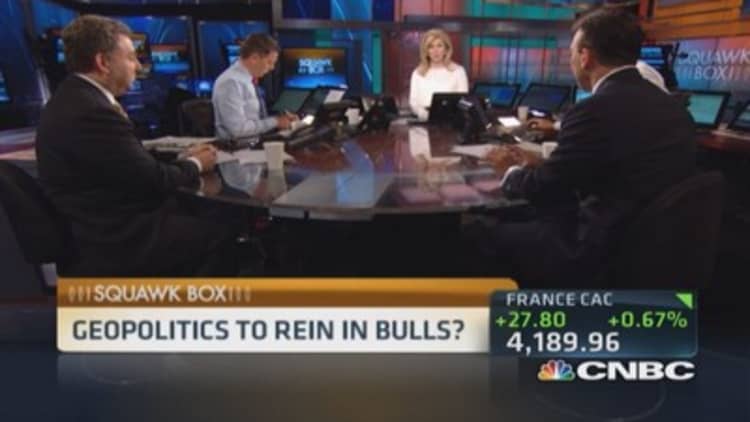The price of Brent crude slipped to a 13-month low on Wednesday, pushed lower by reports of oversupply in the markets. However, some market watchers believe that this softness could be signaling something more sinister in the global economy, with a risk that the weakness could spread to other assets.
"At the end of the day it's all about demand," Michael Hewson, the chief market analyst at brokerage firm CMC Markets told CNBC via telephone. The oil price is simply a leading indicator for demand across the globe, according to Hewson, who predicts the price has more downside risk than upside, barring any unexpected geopolitical event.
He agrees that current global growth forecasts may be too optimistic and depressed demand in Europe and China, along with the anticipated normalization of interest rates in the U.S. and the U.K., could be about to bring investors back down to earth.
Read MoreWeak Chinese data show patchy economic recovery
"I think the (growth forecasts) have been over egging the pudding," he said, adding that he has felt the market has been too upbeat for most of 2014. "Far be it from me to get in front of a runaway train...but I think that train is a bit crowded," he said.

The price of Brent and WTI has been relatively stable for the last two years as the expansive monetary policy by central banks has coincided with a bull run in the equities market. The commodity saw a brief spike in June with fears over an Islamist militant group taking over large parts of northern Iraq.
Read MoreGeopolitics posing 'uneasy comfort' for oil markets
But markets have slipped since that price move, with Brent crude sliding to $102.45 a barrel on Wednesday to trade near its lowest level since June 2013. U.S. crude fell to $97.16 on Wednesday morning, near levels not seen since February this year.
Oil prices have been in this trend in recent weeks despite tensions in Iraq, Libya and Ukraine, however, it was a new report by the International Energy Agency that weighed on markets Wednesday. On Tuesday, the IEA said that oil has seen weak demand in the last few months and an oil glut has helped to keep a lid on prices. It added that markets were "eerily calm" in the face of the mounting geopolitical risks. Commenting on the report Marshall Gittler, a currency market strategist at IronFX, said that U.S. intervention in Iraq – with targeted airstrikes and militarily advisers entering the country – would only mean a further price fall as the risk premium diminishes.
Weak oil prices traditionally can boost some assets, like airline stocks which are heavily reliant on the commodity. However, Kathleen Brooks, a research director at London-based Forex.com, believes that it could have a negative effect on stock markets more generally.
"Oil prices could be trying to tell us something about the global economic outlook," she said in a research note on Tuesday afternoon.
"As geopolitical risk mounts at the same time as some major central banks contemplate normalizing monetary policy, the global growth forecast may be too rosy. If this is the case, then the recent pullback in stocks could be the sign of things to come."
Chris Beauchamp, a market analyst at IG Markets, noted that the Brent price has broken below its rising wedge pattern - which is a bearish trend that suggests it is likely to head in a downward direction. But Beauchamp is adamant that it's the "supply element" that is at work here and any suggestions of a correction may be overdone.


